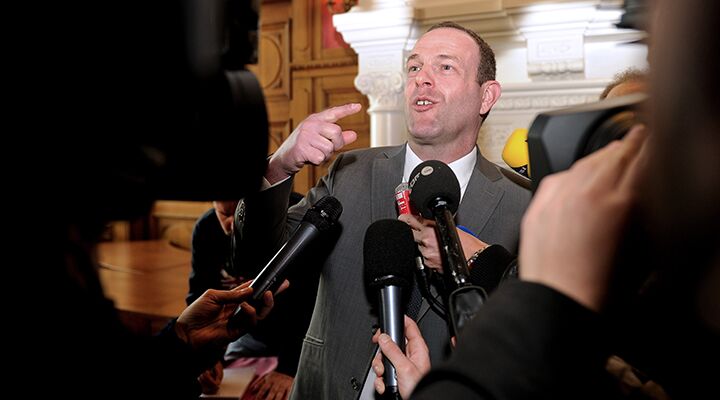
National Front Threatens France’s Political System
France’s National Front (FN) is transforming from an unimportant fringe party to a serious contender in French politics after a record performance in French local elections on March 23.
Until now, France’s political system has been dominated by two parties: the socialists (left-wing party of French President François Hollande) and the center-right Union for Popular Movement—ump (party of former president Nicolas Sarkozy).
But that could be changing. “Bipolar politics is dead,” wrote Le Monde the day after the elections. “It has been replaced by a three-party system including the Socialists, ump and now the FN too.” Bruno Dive, in the Sud Ouest newspaper, called the vote “the death knell for France’s two-party system.”
“There is no doubt that we are seeing the end of the left-right system that has existed up until now,” wrote Dominique Jung in “Dernières Nouvelles d’Alsace.”
tv channel France 24, which collected those quotes, cautions that “worries that the FN is implanting itself firmly in the political mainstream have existed since the early 1980s.” Nonetheless, the FN is having a bigger impact in French politics than ever before.
The ump received the most votes in Sunday’s municipal elections, with around 47 percent of the vote. The Socialists scored 38 percent with the FN at 5 percent.
Lacking the resources of the two main parties, the FN only fielded candidates in 600 out of the 36,000 municipalities—so they only contested one in 60 of the seats available. Six years ago they only gained less than one percent of the vote, meaning they have achieved over five-fold increase.
In Henin-Beaumont, the FN candidate won an absolute majority, winning the election outright. In other locations, even if the FN candidates received the most votes, they will have to face a run-off election with the second-best contender on Sunday. The FN made it into the run-off elections in over 200 cities.
But these elections are only a prelude to the EU parliamentary elections to be held May 25, where the FN plans to be a real contender. With no run-off elections and a full list of candidates, they will be in the same league as the two major parties.
It is still too early to say if the FN has broken into France’s two-party system, but it has certainly made a strong start.
Part of its success comes from the party’s leader, Marine Le Pen, and her shift toward the center—dropping the extreme and anti-Semetic rhetoric that her father used when he led the party.
But the economy also plays a major role. France’s unemployment rate is just under 11 percent. Its youth unemployment is over 25 percent. As the economy stagnates, trust in politicians plummets. French President François Hollande has been setting new records for months with his low approval rating, which has now sunk to around 20 percent. Sunday’s election had the lowest turnout of any French municipal election.
In these circumstances, any outsiders looks like a better option than the people currently in power. The FN’s popularity doesn’t necessarily reflect a widespread support for its proposals: a far-left, statist economic vision, coupled with a dislike of the euro and the EU, plus a distrust of immigrants and Muslims. These policies appeal to different parts of the population. The party’s main draw is that its candidates are not the ones who caused this mess.
Europe saw exactly the same dynamic in the lead-up to World War ii. Across Europe, voters want something new—even to the point of voting for Nazis, communists and fascists.
That’s not to say Le Pen is Adolf Hitler. She’s not. But it is a warning that as economies get worse and people get more desperate, politics can become dangerously unpredictable.
For more on the warning from pre-World War years, read our article “Déjà Vu.”
